May 31, 2017 | Larry Roberts
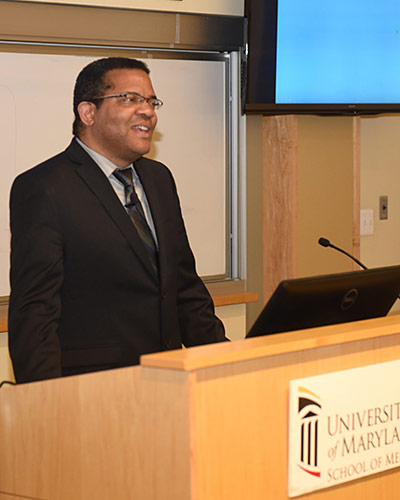
Royak-Schaler Lecture in Health Disparities Highlights Impact of Environment on Health
A range of powerful evidence shows unequivocally that where you live, as well as your social circumstances, play a huge role in your health. This was the message delivered by Anthony B. Iton, MD, JD, MPH, Senior Vice President of Healthy Communities at the California Endowment, in a lecture April 18 at the University of Maryland School of Medicine (UM SOM).
Dr. Iton gave the fourth annual Renee Royak-Schaler Lecture in Health Disparities, an annual series sponsored by the UM SOM Department of Epidemiology and Public Health. The event took place in Taylor Lecture Hall.
He made a powerful case that entrenched inequality and racism are harming the health of tens of millions of Americans. He quoted from his own study, which found that every additional $12,500 in household income leads to a one-year increase in life expectancy. In other words, being poor generally means that you will live a shorter life. He noted that similar gradients have been found in Baltimore, New York City, Philadelphia and other cities and regions of the country.
He also pointed out that these disparities are not limited to people of color. Whites in the United States have a life expectancy of 79 years, which is lower than 33 countries, including Chile, Portugal, Italy and Singapore.
This state of affairs is not a given, he said. He recalled his shock at seeing the entrenched inner-city poverty of Baltimore after moving there from Montréal to go to medical school at Johns Hopkins University. Coming from Canada, such desolation seemed unimaginable, he said.

Dr. Iton argued that 80 percent of what influences life expectancy occurs outside the health care system. He said that it is likely that the health effects of poverty and bad environment are mediated by stress. Poor housing, racism, boring, low-paying jobs or unemployment, lack of access to stores and services, and crime all trigger stress, which has a wide range of damaging health effects. Studies have found that stress plays a role in cardiovascular disease, diabetes, infection, inflammation, and brain related problems.
He also argued that although better healthcare was part of the solution, other factors were much more important. Really improving health, he said, would require changing biased beliefs, transforming policies and practices that lead to inequality, and providing significant help to neglected communities. It is essential, he said, to strengthen the social compact and foster a culture of inclusion that includes all citizens.
He ended his lecture with a quote from famed 19th century German doctor, scientist and public health pioneer Rudolf Virchow: “Physicians are the natural attorneys of the poor, and social problems fall to a large extent within their jurisdiction”.
 The California Endowment is a non-profit foundation that works to make California a healthier place for all. It was created in 1996 when, and has more than $3 billion in assets. It has developed several effective programs to improve health, including and provide benefit for millions of Californians.
The California Endowment is a non-profit foundation that works to make California a healthier place for all. It was created in 1996 when, and has more than $3 billion in assets. It has developed several effective programs to improve health, including and provide benefit for millions of Californians.
Prior to his appointment at the organization, Dr. Iton served as both the director and County Health Officer for the Alameda County Public Health Department. There, he oversaw the creation of an innovative public health practice designed to eliminate health disparities by tackling the root causes of poor health that limit quality of life and lifespan in many of California's low-income communities. He also served for three years as director of Health and Human Services and School Medical Advisor for the City of Stamford, Connecticut.
Dr. Iton, who has been published in numerous public health and medical publications, earned his BS in Neurophysiology, with honors, from McGill University, in Montreal, Quebec, his JD at the University of California, Berkeley's Boalt Hall School of Law, and his medical degree from Johns Hopkins University School of Medicine.
“This lecture was a powerful statement about the close connection between the social and built environment and health,” said Jay Magaziner, PhD, MS Hyg, Professor and Chair, Department of Epidemiology and Public Health. “Dr. Iton marshaled a wide range of evidence to back up this crucially important but often under-recognized point.”
The event was underwritten by a generous donation from the family of the late Dr. Renee Royak-Schaler.
Contact
Department of Anesthesiology
(410) 328-6120 (phone)
(410) 328-5531 (fax)
swalsh@som.umaryland.edu
University of Maryland School of Medicine
Larry Roberts
Web Communications
410-706-4939
lroberts@som.umaryland.edu
Related stories
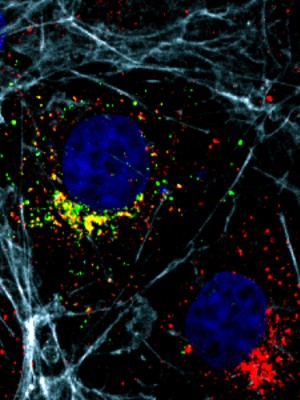
Monday, June 21, 2021
UM School of Medicine Researchers Discover Genetic Cause of Neurodevelopmental Disorder
University of Maryland School of Medicine (UMSOM) researchers identified a new gene that may be linked to certain neurodevelopmental disorders and intellectual disabilities. The researchers believe that finding genes involved in certain types of developmental disorders, provide an important first step in determining the cause of these disorders and ultimately in developing potential therapies for treating them.

Wednesday, June 16, 2021
UM School of Medicine Researchers Awarded $5 Million NIH Grant to Improve Use of Genetic Risk Scores in Diverse Populations
Researchers at the University of Maryland School of Medicine (UMSOM) have received a $5 million federal grant to pool genomic information from existing and new datasets – predominantly in African and African American populations -- in order to calculate the risk of developing specific diseases. They will use sophisticated modeling and genetic datasets to calculate the risk, known as a polygenic risk score, with an emphasis on studying people from different ancestries.
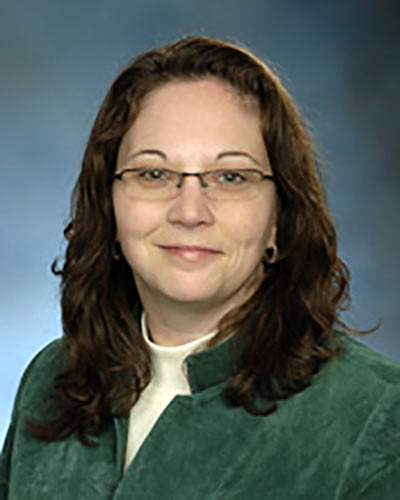
Tuesday, November 21, 2017
University of Maryland School of Medicine Researchers Set Standards for What Diseases Should Be Called
Researchers at the University of Maryland School of Medicine (UM SOM) are searching through medical journals, databases and other authoritative sources to establish standard terms for diseases as a way to help future researchers better understand a wide range of diseases like cancer. The work involves a time-intensive manual curation process, examining the breadth of information, naming systems and levels of evidence in order to integrate information and bridge data across resources.
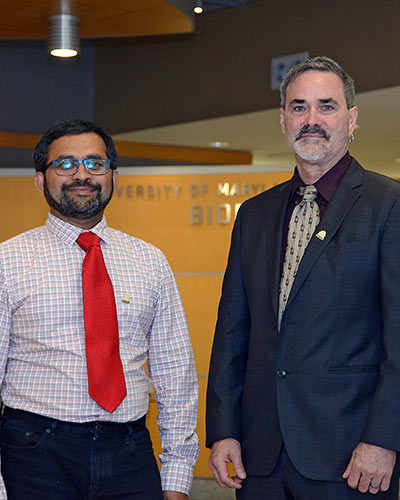
Friday, September 29, 2017
University of Maryland School of Medicine Researchers Identify Millions of New Genes From Bacteria Living on and in the Human Body
A new study of the human microbiome—the trillions of microbial organisms that live on and within our bodies—has uncovered millions of previously unknown genes from microbial communities in the human gut, skin, mouth, and vaginal microbiome, allowing for new insights into the role these microbes play in human health and disease.
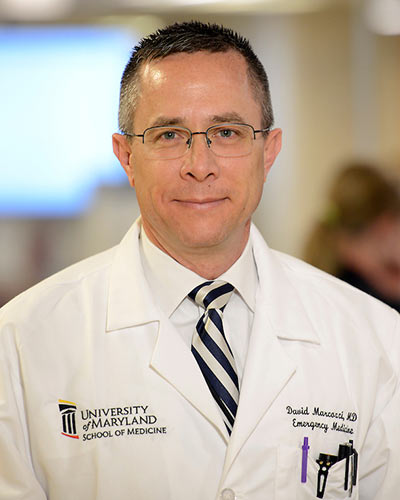
Tuesday, June 27, 2017
University of Maryland School of Medicine Names David Marcozzi to Help Lead Health Disparities and Population Health Program
Jay S. Magaziner, PhD, MS, Hyg, professor and chair of the Department of Epidemiology and Public Health (EPH) at the University of Maryland School of Medicine (UM SOM), along with UM SOM Dean E. Albert Reece, MD, PhD, MBA, announced today that David Marcozzi, MD, MHS-CL, FACEP, an associate professor in the UM SOM Department of Emergency Medicine, has been named as Co-Director of the UM SOM Program in Health Disparities and Population Health, which is based in EPH.
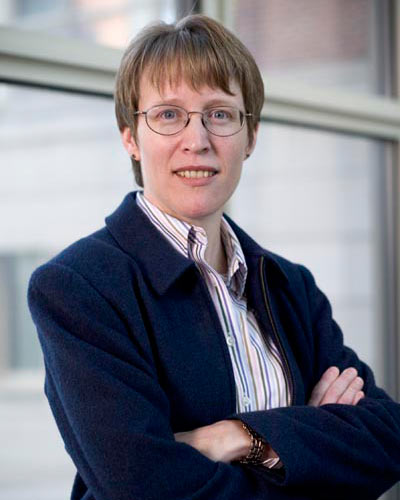
Tuesday, April 04, 2017
University of Maryland School of Medicine Physician Scientist Receives Top Award in Epidemiology from Physician's Group
Mary-Claire Roghmann, MD, MS, Professor of Epidemiology and Public Health, and Associate Dean for Physician Scientist Training and Transdisciplinary Research Advancement, at the University of Maryland School of Medicine (UM SOM), as well an Associate Hospital Epidemiologist and Investigator at the VA Maryland Health Care System, has been awarded the Alvan R. Feinstein Memorial Award from the American College of Physicians (ACP). The award was presented in San Diego at ACP’s Convocation Ceremony on March 30, 2017, during its annual scientific conference, Internal Medicine Meeting 2017.
